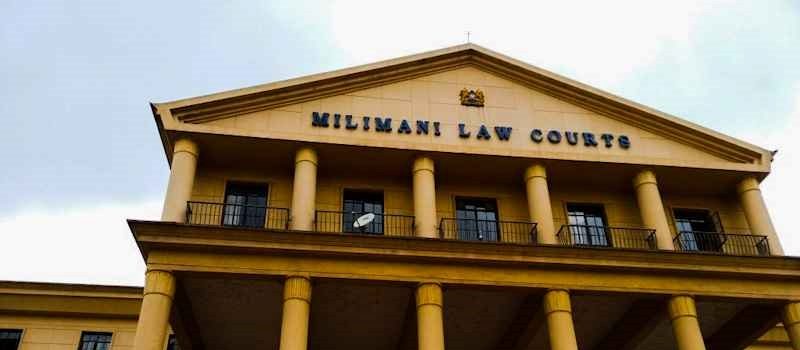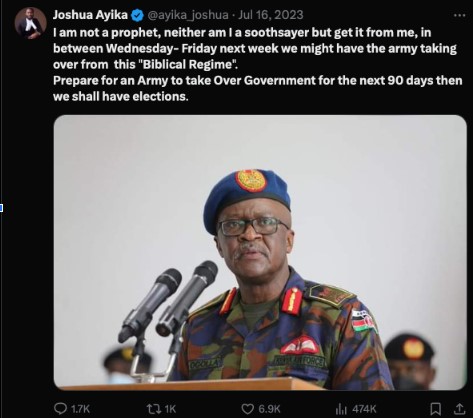On 21 July 2023, Joshua Otieno Ayika, an advocate, was arrested after posting a tweet on his X handle @Ayika_joshua, which stated as follows:
“I am not a prophet, neither am I a soothsayer, but get it from me, in between Wednesday – Friday next week, we might have the army taking over from this “Biblical Regime'”. Prepare for an army to take over government for the next 90 days then we shall have elections.”
He was later arraigned and charged before the Chief Magistrate’s Court in Makadara in Nairobi. The first count related to the offence of “Subversive Activities” contrary to Section 77 (1) (a) of the Penal Code, Cap 63, and the second count was for “Publication of false information” contrary to section 23 of the Computer Misuse and Cyber Crimes Act, 2018.
According to the Office of the Director of Public Prosecutions and the Inspector General of Police, the tweet’s words were prejudicial to Kenya’s public order and security and calculated to cause panic and chaos among citizens.
Subsequently, several human rights organisations filed petitions before the High Court sitting in Nakuru, challenging the validity of section 77 of the Penal Code and questioning its place in a modern democratic state like Kenya, given its limitation of freedom of expression through the vaguely worded offence of “subversion”.
The organisations included the Katiba Institute, the Law Society of Kenya, the International Commission of Jurists-Kenya (ICJ-Kenya), the Blogger Association of Kenya, the Kenya Union of Journalists, the Africa Center for Open Governance (AFRICOG), ARTICLE 19 Eastern Africa, Kenya Human Rights Commission (KHRC), and Tribeless Youth. The accused, Joshua Otieno, appeared as an interested party.
The key arguments during the trial by the Petitioners were that Section 77 of the Penal Code:
- Impaired freedom of expression by criminalising and punishing “any person” “who utters” “any words” with a “subversive intention”.
- By its purpose and effect limited freedom of expression and was unconstitutional unless proved to be reasonable and justifiable.
- Did not meet the three-part test, as it was not: provided by law; serve a legitimate aim; and necessary in an open and democratic society.
- Is not necessary in an open, modern and democratic society.
The Respondents opposed the Petitioners’ case, arguing that:
- The petition did not meet the threshold of specificity of the actual violation to warrant the orders sought as set out in the Mumo Matemu case
- The offence was recognised in law
- The application offended Article 169 of the Constitution and did not meet the threshold for the grant of conservatory orders.
- The petition did not raise any grounds of illegality of section 77 of the Penal Code.
In his judgement delivered on 18 March 2024, Justice Mohochi S. M. considered the various submissions and noted that:
“It is not far from our lips and eyes that independent Kenya inherited from the colonial state a repressive system, Sedition criminal prosecution was the hall mark of post-independence Kenya, “mwakenya” and “pambana” prosecutions, nyayo house torture and this dark chapter of the nation constrains this court to recall the same owing to the response to this petition by the 1 st and the 3rd Respondent.”
The court went on to state that: “Section 77(1) and (3) of the penal code is a colonial legacy which limits freedom of expression through the vaguely worded offence of subversion.” Also, it found that the provisions of the section 77 were “over broad and vague, and that they limit the right to freedom of expression and there is lack of clarity as to the purpose and intent and the limitation in section 77 is not “provided by law”.
The court stated that the provision served no legitimate aim and was not strictly necessary in an open and democratic state. Consequently, the court declared sections 77 (1) and (3)(a), (b), (c), (d), (e), (f), and (g) of the Penal Code, Cap 63, unconstitutional.
This case is significant because it re-emphasises the importance and place of freedom of expression online and ends the reign of colonial-era laws being dusted and used to suppress expression online and on social media platforms. Moreover, it embeds the three-part test by recognising that any restriction on freedom of expression must be prescribed by law for a legitimate purpose and necessary in an open and democratic society.
The decision follows the direction of similar cases, such as Andare v. Attorney General and Jacqueline Okuta & v. Attorney General, which have quashed the use of criminal or penal provisions to unjustifiably limit freedom of expression, especially where the speech complained of related to government or government officials.
In conclusion, this is an influential judgement and a crucial win for Kenya, Africa, and beyond. More than 65 countries hold elections, and freedom of expression and political rights often come under attack during these periods. We celebrate the court and the advocates and organisations for their valiant efforts in pursuit of justice and constitutionalism.
Victor Kapiyo is an Advocate of the High Court and a Trustee at KICTANet.
![]()





